
Tips & advice for car and suv tyres
Under certain conditions, the tyre sidewall can be damaged to a greater or lesser extent. What kind of damage? When does it occur? What to do about it? How can it be avoided? In this article, we answer these questions.
What types of tyre sidewall damage can occur?
There are 6 main categories of sidewall damage:
1 - Tyre sidewall scratches and nicks
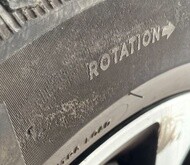
Scratches may appear on the sidewall of your tyres. If they are numerous and/or pronounced, you should have your tyres examined by a professional
2 - Tyre sidewall cuts
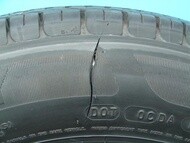
A cut in the tyre sidewall can be more or less deep.
The severity of the cut will depend on this. But it is difficult for a non-expert to assess its depth.
- If the cut is deep, it may have damaged the carcass ply that lies under the rubber and helps contain the pressure. If the carcass ply is damaged, there is a risk of sudden pressure loss. In this case, the tyre is not repairable and needs to be replaced.
- If the cut is not deep, it may not be an immediate danger, but it could escalate and compromise your safety.
Note that this type of damage can occur on the inner sidewall (not visible when you examine your vehicle) of the tyre as well as on the outer sidewall.
For these reasons, after driving over sharp elements (e.g. sharp stones), it is recommended that you have your tyres checked to ensure that they are free of cuts.
3 - Tyre sidewall bulges and bubbles
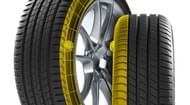
When your vehicle drives onto a kerb, either from the front or at an angle, or a pothole a bulge may appear on the sidewall of a tyre.
It looks like a bubble forming on the tyre sidewall.
It is probably one of the most alarming signals as it constitutes a real danger.
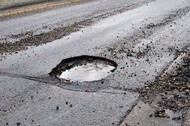
Pothole tyre damage
Driving into a pothole can also cause a bulge on your tyre sidewall. Try to avoid them when you see them on the road!
If you do hit a kerb or a pothole, you should have your tyres checked to see if they have been damaged or not.
Why is a tyre bulge dangerous?
The appearance of a bubble on the tyre sidewall means that the carcass ply behind the rubber has been punctured. This exposes you to a rapid loss of pressure if the bubble bursts. If this happens while driving fast, for example on the motorway, the sudden loss of air from your tyre can cause the loss of control of your vehicle and lead to an accident.
As with cuts, a bulge can occur on both the inner and outer side of the tyre. This means that it may not be visible when you walk around your vehicle to examine it. However, when there is a bulge in a tyre, abnormal vibrations are usually experienced. This is a sign that should not be taken lightly and that your tyres should be checked urgently by a professional.
Can speed bumps damage tyres and cause a bulge?
No. As they are designed with a slope to go up and down, they may damage the suspensions, but not the tyre.
4 - Tyre sidewall cracks

Sidewall cracks are a sign of ageing of your tyres but also of exposure to sun and ozone.
Another cause may be the cleaning of the sidewall of the tyres. If you use chemicals to shine your tyres, they may remove the protective agents and therefore expose your tyres to cracking more quickly.
The appearance of cracks in the tyre sidewall is a warning sign that the tyre is nearing the end of its life and that you should prepare to change it. You can consult a professional for advice.
The appearance of cracks in the tyre sidewall is a warning sign that the tyre is nearing the end of its life and that you should prepare to change it. You can consult a professional for advice.
5 - Tyre sidewall slight deformation
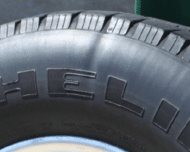
It is quite normal to observe slight deformations in radial tyres (the majority of tyres).
This does not affect their performance.
The sidewall of your tyres is made up of many components including plies (textile or metal).
You will often notice a slight deformation where the plies overlap.
6 - Tyre sidewall puncture
When the tyre tread (the part that is in contact with the ground surface) is punctured (for example by a nail), a repair is possible.
The hole is filled in and once the tyre is reassembled, it can be driven again with the same performance.
However, it is different for the tyre sidewall. If the sidewall is punctured or cut, it is impossible to repair the tyre and to regain its deformation qualities which are required for optimum performance. The tyre must therefore be replaced in this case.

Find a tyre dealer near you in seconds
Search by
Address, City or ZIP code
Car
Locate me
Top 5 cities in Africa
How to prevent tyre sidewall damage

- Make sure your tyres are inflated to the recommended pressure (you can usually find the information in your vehicle manual or on a sticker in the driver's door)
- Avoid bumping into kerbs
- Avoid driving into potholes
- Inspect your tyres regularly for cracks, cuts, tears or bulges
- Avoid cleaning the sidewall of your tyres with cleaning products, especially those containing silicone.
Find the perfect tyre
Enter your vehicle or tyre size
We're searching for your tire...
Wait few seconds we're processing your photo

